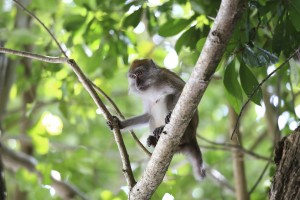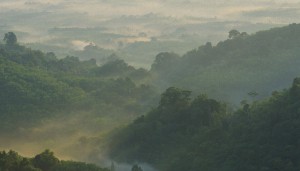Discover the research programme that we implement in collaboration with WWF and CEFE to evaluate the impact of the FSC certification on the biodiversity of tropical forests.
The FSC certification for a better forest management
Forests host almost half of global biodiversity. They play an essential role in soil conservation, in the water cycle and mitigation of climate change impacts. About 400 years ago, forests covered two third of the lands, today they only occupy one third. With a deforestation rate of about 16 million hectares per year, forest biodiversity is truly threatened. After the 1992 Earth Summit in Rio, a group of businesses, environmentalists and community leaders, created the “Forest Stewardship Council” (FSC), an international independent and non-profit organisation, whose mission is to promote better management of forests on the planet. The FSC is an environmental label ensuring that the production of wood or a wood-based product observes the procedures intended to guarantee sustainable forest management. It also includes respect for social, environmental and economic, as well as cultural and spiritual needs of present and future generations.
A lack of evidence on the effectiveness of this certification
The compliance with FSC standards can, in theory, generate positive effects on habitat conservation, wildlife and flora. However, evidence on the effectiveness of the label is lacking, as it has not yet been demonstrated that the implementation of FSC standards generates real environmental benefits. To date, there is no proven methodology available to enable forest management units to assess biodiversity in the forests they use.
How eDNA can help to assess the impact of FSC certification

In 2015, SPYGEN, WWF and the CEFE (Centre d’Ecologie Fonctionnelle et Evolutive – France), gathered to implement a research programme for assessing biodiversity in FSC-certified and non-certified forest management units, using environmental DNA. This study is conducted in tropical countries where this certification has been applied for several years, specifically in Cameroon and Peru. The biodiversity assessment is carried out on several taxonomic groups, from different types of matrices (water, faeces, soil).
The objective of this project is to assess in a concrete and objective way the FSC certification impacts on the conservation of biodiversity and to help to build a convincing argument for requesting FSC certified products in consumer countries. This will also motivate producers to move towards more respectful practices through FSC certification.
Forest biodiversity assessment methods that will be implemented in the framework of this project can then be used on a larger scale and in the long term to study the effectiveness of the FSC label around the world, but also to assess the impact of other environmental labels.
Programme news:
April 2015: Kick-off meeting for this project / Identification of target taxonomic groups and sampling methods to implement on the study sites (Lima – Peru).


